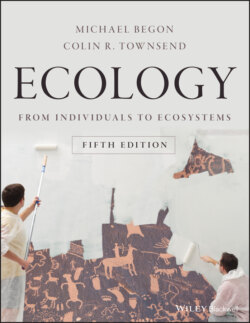Читать книгу Ecology - Michael Begon - Страница 39
2.3 Responses of individuals to temperature 2.3.1 What do we mean by ‘extreme’?
ОглавлениеIt seems natural to describe certain environmental conditions as ‘extreme’, ‘harsh’, ‘benign’ or ‘stressful’. It may seem obvious when conditions are ‘extreme’: the midday heat of a desert, the cold of an Antarctic winter, the salinity of the Great Salt Lake. But this only means that these conditions are extreme for us, given our particular physiological characteristics and tolerances. To a cactus there is nothing extreme about the desert conditions in which cacti have evolved; nor are the icy fastnesses of Antarctica an extreme environment for penguins. It is lazy and dangerous for the ecologist to assume that all other organisms sense the environment in the way we do. Rather, the ecologist should try to gain a worm’s‐eye or plant’s‐eye view of the environment: to see the world as others see it. Emotive words like harsh and benign, even relativities such as hot and cold, should be used by ecologists only with care.
